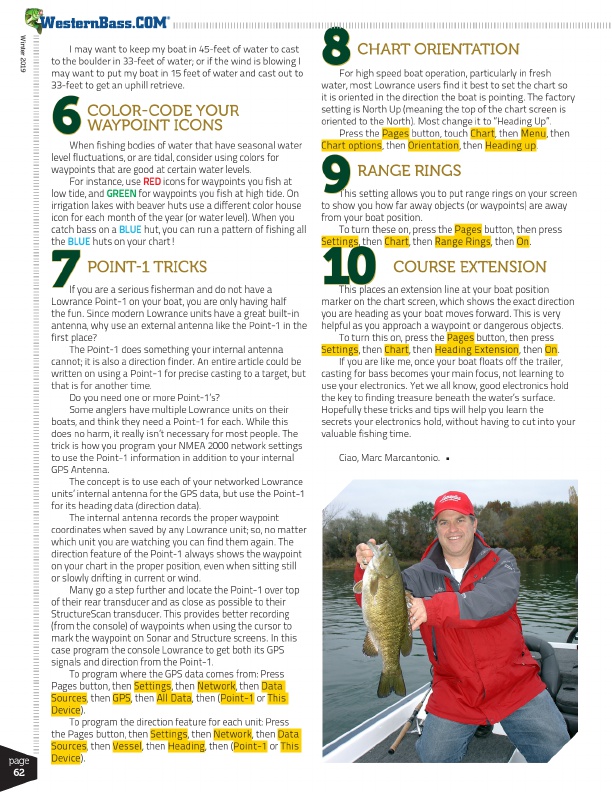
Winter 2019
page 62
®
I may want to keep my boat in 45-feet of water to cast to the boulder in 33-feet of water; or if the wind is blowing I may want to put my boat in 15 feet of water and cast out to 33-feet to get an uphill retrieve.
6
COLOR-CODE YOUR WAYPOINT ICONS
When fishing bodies of water that have seasonal water
level fluctuations, or are tidal, consider using colors for
waypoints that are good at certain water levels.
For instance, use RED icons for waypoints you fish at
low tide, and GREEN for waypoints you fish at high tide. On
irrigation lakes with beaver huts use a different color house
icon for each month of the year (or water level). When you
catch bass on a BLUE hut, you can run a pattern of fishing all
the BLUE huts on your chart!
7
POINT-1 TRICKS
If you are a serious fisherman and do not have a
Lowrance Point-1 on your boat, you are only having half
the fun. Since modern Lowrance units have a great built-in
antenna, why use an external antenna like the Point-1 in the
first place?
The Point-1 does something your internal antenna
cannot; it is also a direction finder. An entire article could be
written on using a Point-1 for precise casting to a target, but
that is for another time.
Do you need one or more Point-1’s?
Some anglers have multiple Lowrance units on their
boats, and think they need a Point-1 for each. While this
does no harm, it really isn’t necessary for most people. The
trick is how you program your NMEA 2000 network settings
to use the Point-1 information in addition to your internal
GPS Antenna.
The concept is to use each of your networked Lowrance
units’ internal antenna for the GPS data, but use the Point-1
for its heading data (direction data).
The internal antenna records the proper waypoint
coordinates when saved by any Lowrance unit; so, no matter
which unit you are watching you can find them again. The
direction feature of the Point-1 always shows the waypoint
on your chart in the proper position, even when sitting still
or slowly drifting in current or wind.
Many go a step further and locate the Point-1 over top
of their rear transducer and as close as possible to their
StructureScan transducer. This provides better recording
(from the console) of waypoints when using the cursor to
mark the waypoint on Sonar and Structure screens. In this
case program the console Lowrance to get both its GPS
signals and direction from the Point-1.
To program where the GPS data comes from: Press
Pages button, then Settings, then Network, then Data
Sources, then GPS, then All Data, then (Point-1 or This
Device).
To program the direction feature for each unit: Press
the Pages button, then Settings, then Network, then Data
Sources, then Vessel, then Heading, then (Point-1 or This
Device).
8
CHART ORIENTATION
For high speed boat operation, particularly in fresh
water, most Lowrance users find it best to set the chart so
it is oriented in the direction the boat is pointing. The factory
setting is North Up (meaning the top of the chart screen is
oriented to the North). Most change it to “Heading Up”.
Press the Pages button, touch Chart, then Menu, then
Chart options, then Orientation, then Heading up.
9
RANGE RINGS
This setting allows you to put range rings on your screen
to show you how far away objects (or waypoints) are away
from your boat position.
To turn these on, press the Pages button, then press
Settings, then Chart, then Range Rings, then On.
10
COURSE EXTENSION
This places an extension line at your boat position
marker on the chart screen, which shows the exact direction
you are heading as your boat moves forward. This is very
helpful as you approach a waypoint or dangerous objects.
To turn this on, press the Pages button, then press
Settings, then Chart, then Heading Extension, then On.
If you are like me, once your boat floats off the trailer,
casting for bass becomes your main focus, not learning to
use your electronics. Yet we all know, good electronics hold
the key to finding treasure beneath the water’s surface.
Hopefully these tricks and tips will help you learn the
secrets your electronics hold, without having to cut into your
valuable fishing time.
Ciao, Marc Marcantonio. •